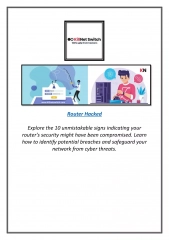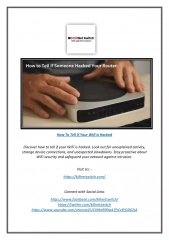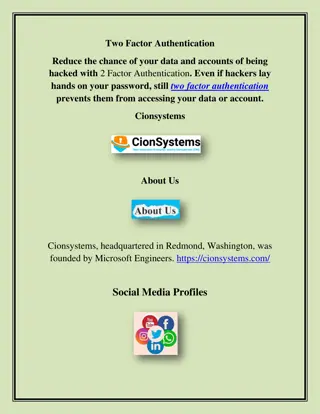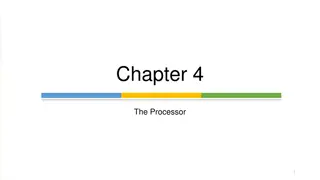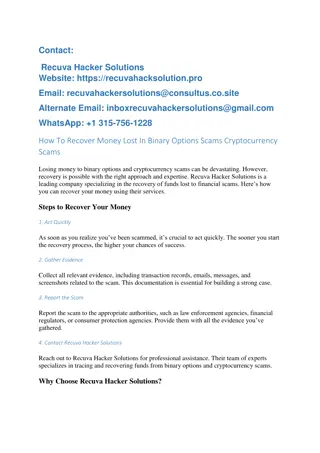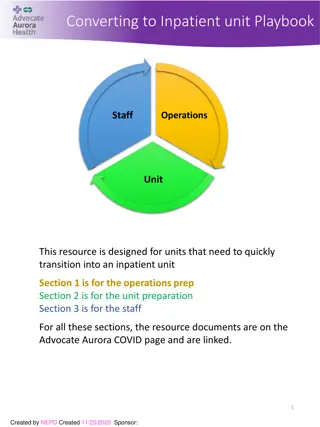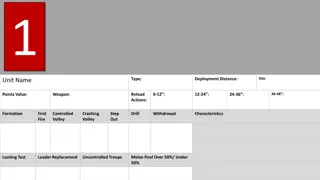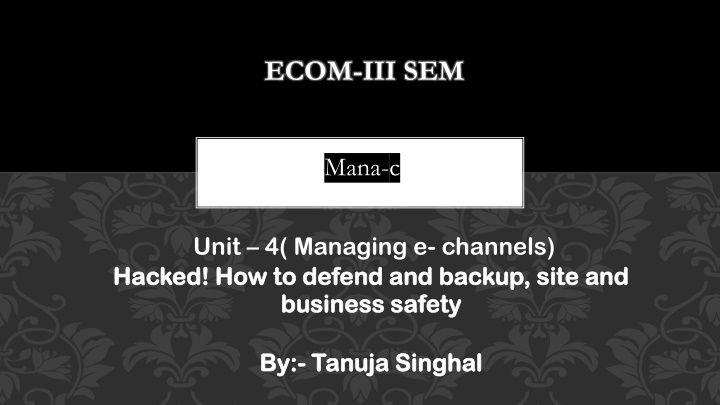
Protect Your Website from Hacking with Effective Security Measures
Learn how to defend your site from hacking threats by implementing essential security measures such as installing software updates, using SSL, setting up a firewall, and choosing a reliable hosting provider. Safeguard your online business and data with these tips to prevent cyber attacks and ensure business safety.
Download Presentation

Please find below an Image/Link to download the presentation.
The content on the website is provided AS IS for your information and personal use only. It may not be sold, licensed, or shared on other websites without obtaining consent from the author. If you encounter any issues during the download, it is possible that the publisher has removed the file from their server.
You are allowed to download the files provided on this website for personal or commercial use, subject to the condition that they are used lawfully. All files are the property of their respective owners.
The content on the website is provided AS IS for your information and personal use only. It may not be sold, licensed, or shared on other websites without obtaining consent from the author.
E N D
Presentation Transcript
ECOM-III SEM Mana-c Unit 4( Managing e- channels) Hacked! How to defend and backup, site and Hacked! How to defend and backup, site and business safety business safety By: By:- - Tanuja Singhal Tanuja Singhal
WAYS TO PROTECT YOUR SITE FROM HACKING
Hundreds of websites get hacked every day. Hackers use numerous vulnerabilities that are found in compromised apps and platforms, which appear due to failure to back them up on time. That s why backing up a website s data is crucial. Because there is always a possibility that you get hacked, and you never know when this happens, it is imperative that you create a reserve copy of your website data. It will help you retrieve important business information in case of a disaster. Reserve copies can and should be stored in archived files, which you d better save on additional servers, external drives, and other data storage facilities.
1. INSTALL THE UPDATES OF SOFTWARE WHEN RECOMMENDED Installing any plugin or a software and let it run is just like keeping your front door open to invite thieves to enter into your house. Once the software informs you about the new version or update, do it. Update your plugin from a trusted website only and limit the number of plugins installed on your site because every plugins has some vulnerability
2. START USING SSL RIGHTNOW Using a Secure Socket Layer (SSL) is essential communication between the browser and the website server and thus levels up to the security many times. these days. It encrypts the E-commerce sites often ask for sensitive information such as debit/credit card details, Internet Banking password, etc. With SSL/TLS, every information is encrypted before sending it to the website and thus prevent eavesdroppers from accessing the same. Overall, it helps to maintain the confidentiality of users' information.
3. USEFIREWALL Internet is filled with different kinds of Viruses and Trojans. A lot of websites already got compromised due to them because they failed to implement proper security measures at the right time. A firewall is a kind of layer between your system and coming traffic. It's capable of avoiding Trojans and virus attacks and sends you an alert when any suspicious event occurring on your server. Every eCommerce website should have an extra layer of the security login page, contact forms, and search queries. It monitors traffic coming to your server, allows you to set a predefined access control list, and also avoid SQL injection and cross-site Scripting attacks.
4. CHOOSE YOUR HOSTING PROVIDERWISELY Hosting plays a critical role in your website's success. That's why you should never choose a hosting provider just by getting attracted to their lucrative offer. Instead, go with the one that offers essential tools and applications to develop and manage an eCommerce website easily and securely. You can look for the following characteristics while choosing a good hosting provider: Performs regular backups. Performs regular network monitoring. Maintains detailedlogs. Clear with the policies and procedures they have in case of anattack. Employs high-grade encryption (at least 128 bitAES). Provides seamless support inemergencies.
5. DONT STORE SENSITIVEINFORMATION FROMCUSTOMERS E-commerce websites should only collect and store minimum information for current use and no more than that. For processing credit cards, use an encrypted checkout tunnel to ensure your own servers can never see the customer's card details. It might sound a little inconvenient to users, but a lot of websites are already using it, and believe me, its benefits far outweigh the risk of compromising credit card numbers.
6. REMOVE SOFTWARE THAT RISKS YOUR WEBSITE'SSECURITY A website is developed using many components, and all of them are not secure. If you're building a new site or redesigning, look for safer choices. For example, HTML 5 will help you eliminate potential risks of Java. Also, try to avoid Adobe Flash and other risky applications wherever possible. If you cannot avoid those applications, make sure you update them regularly to have the most secure version.
7. CORRECTLY CONFIGURE ESSENTIALPROTECTIONS Just buying a firewall to protect your website won't help. You have to correctly configure its essential protections to make most out of it. If you are in full control of your eCommerce website and can access the network security infrastructure, it's terrific. Otherwise, ask your developer or hosting provider or whoever is maintaining your website to implement the following security services. Data loss detection Data loss prevention Intrusion detection and trackingservices DDoS protection Advanced threat detection Fraud managementservice Reputationdefences Antimalwarefeature
8. SET UP A SYSTEMALERT You just can't let your customers use your website or place an order in any way they want. Every merchant must have an 'alert system' that will notify whenever it finds a person suspicious during their online transactions. Your system must be able to identify if a person places multiple orders with different addresses, credit cards, mobile numbers, etc. You can also check that the order recipient name matches with card details to avoid suspicious transactions. You can also assign a team to check If a multiple order request is coming from the same IP and inform the same to the server administrators.
9. TEST YOUR WEBSITEREGULARLY If you want to protect your eCommerce site from hackers, you must test your website regularly to ensure everything is working perfectly fine. Thisincludes: Normal Scanning: Check all the pages and links of your site carefully to ensure hackers have not introduced any malware into graphics, advertisement of contentprovided by the thirdparties. Professional Scanning: When it comes to protecting a website from harmful elements of the Internet, consider hiring professional cybersecurity consultants or ethical hackers for in-depth analysis and identifying vulnerabilities in the code. Security apps: Sometimes, leftover source code or debug code itself become a pathway for hackers and put confidential data at risk. You should look into web application scanning tools to identify a variety of vulnerabilities such as Cross- site Scripting (XSS) or finding potential dangers in the leftovercode.
10. ASK YOUR CUSTOMERS TO SET STRONGPASSWORD As you know that you can't clap with one hand and that's even true in this case. You cannot ensure the security of your website if your customers are not following basic security guidelines. Hackers don't need any specific route to enter into your site; they keep looking for security loopholes to perform attacks. Ask your customer to set a long and strong password containing capital letters, small letters, number, and special characters. You can also remind your customers to change their passwords in a regular interval of time.
There are a lot of things you can do to keep your website safe, from choosing a top-notch web host to using strong passwords. However, the single most important step you can take is to perform website backups early and often. Having a recent backup of your site can help you in many situations. If you lose crucial data or your website gets hacked, having a backup readily available can solve your problems. Plus, it often doesn t take more than a few minutes to get that backup file ready. 5 reasons to perform a website backup 1. Accidents happen. 2. Getting hacked is a grim reality. 3. Computers crash all the time. 4. Updates can go wrong. 5. You miss a bill or payment.
1. ACCIDENTS HAPPEN People make mistakes it s an unavoidable, universal truth. Someone could click the wrong button, deleting an integral file, and the next thing you know your site is broken. Most people assume their hosting provider safeguards them from such things, it s still possible they won t have the latest copy of your website. Most hosting providers don t perform regular backups unless you re paying for a website backup service.
2. GETTING HACKED IS A GRIM REALITY WordPress, the most commonly used content management system (CMS), accounts for approximately 27 percent of all websites currently live on the internet. It s also an open-source platform, which means anyone and everyone has access to the coding. When WordPress updates their core files, all the exploitable vulnerabilities that were corrected with that update are now known to hackers around the world, who then update their malware injection bots to go forth and infect sites that aren t being updated on a regular basis. If you re running a WordPress site, this could spell danger for you. As a small business owner, your days are hectic, we get it. You might miss that core update or not get to it until a few weeks down the line. But if you re not maintaining a website backup and skipping out on updates, you could be out some serious bucks. In fact, according to the Denver Post, 60 percent of small businesses who suffer from a malware attack are out of business within six months.
3. COMPUTERS CRASH ALL THE TIME Just because you keep a backup on your local computer doesn t mean you re safe. While it s a good practice, computers still crash all the time. The hard drives become unreadable, and all the effort you put into backing up your site could disappear in an instant. To cover all your bases, consider making at least three website copies: one that s off site and maintained by a reputable vendor, one on your local machine or external drive, and one on the live site itself. In general, it s a good idea to be liberal with your backups. Delete only what you know you no longer need, and keep multiple copies to ensure you have a functioning, current version of your site.
4. UPDATES CAN GO WRONG Sometimes, updating your core files or a plugin doesn t go as expected. All you do is press the update button, and next thing you know your site is no longer live. Your boss is calling, your customers are complaining, you re losing money, and there s much wailing and gnashing of teeth. Wouldn t it be super nice if you could just hit a button and restore your website to its previous state? I m going to go with a yes on this one.
5. YOU MISS A BILL OR PAYMENT It happens all the time. You got a new card and forgot to update the information on file with your hosting provider. They tried billing you several times, but the failed billing notices all went to your junk folder. Eventually, your site goes down. You ll have to repurchase your hosting plan, of course, but you might also be looking at a restore fee to bring your site back online (assuming they offer one, that is). Aside from the added cost of restoring your site, you re now also looking at lost time. Time spent on the phones with your provider, time without a site for visitors to browse, time without potential profit. As we all know, time is money and time wasted is money wasted. Maintaining a proper website backup could save you tons in both aspects.
CONCLUSION These were some of the useful ways to keep your website protected from hackers. The fact is your customers depend on you for the security of their data. They believe in you that you'll take care of their privacy seriously. That's why you should always keep a strong check on the security of your website and provide a hassle-free experience to your customers.

